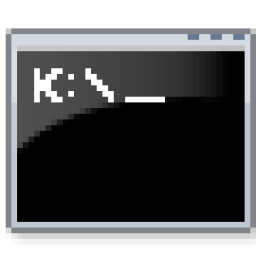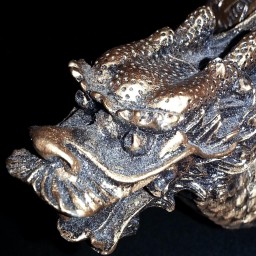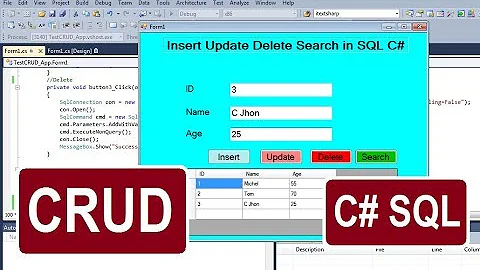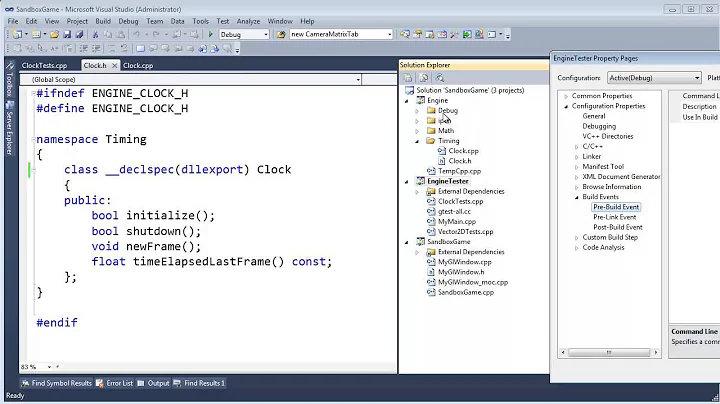How to put double quotes in VS2010 post build step
Solution 1
I was having trouble using double quotes with a pre-build event command in Visual Studio. I have seen the batch file solutions to this problem, but it seems a batch file would not solve all problems and is not elegant. I found the solution was to put a space before the closing double quote. The details are as follows.
The following command worked, but would not support spaces in the path:
subwcrev $(SolutionDir) $(SolutionDir)subwcrev_template.txt $(SolutionDir)version.h
I have little control over where other developers will place the solution, so I had to support spaces in the path. Trying to use quotes around paths to support spaces, I came up with the following command. It always fails.
subwcrev "$(SolutionDir)" "$(SolutionDir)subwcrev_template.txt" "$(SolutionDir)version.h"
Almost by accident, I found the solution, put a space between the last character of the path and the double quote.
subwcrev "$(SolutionDir) " "$(SolutionDir)subwcrev_template.txt " "$(SolutionDir)version.h "
This worked. I tested this in AVR Studio 6.1, which uses a Visual Studio Shell.
Solution 2
Visual Studio project files are XML files. Some special characters, such as the double quote, have to be escaped by using named entities. I think they're similar to what's used for encoding strings to html.
MSDN has a reference on How To Use Reserved XML Characters in Project Files. In your example, all you would need to do to accomplish your copy is this in the .csproj/.vbproj file:
copy "$(SolutionDir)$(Configuration)\*" "$(TargetDir)"
That will wrap both paths in double quotes. You'll get errors when referencing paths with spaces and that's why the double quotes are required.
Solution 3
You need to put a double quote within two double quotes.
Example of a copy file in a post build step:
copy /Y """C:\source path with spaces\somefile.txt""" """C:\destination path with spaces\"""
Solution 4
I couldn't get the other answers to work.
I finally just escaped the last "\":
"$(TargetDir)\"
Solution 5
Please, oh please don't use post build events.
Instead, use the power of MSBuild's AfterBuild target:
Right click on your project and select Edit Project File. Add an AfterBuild event:
<Target Name="AfterBuild">
<ItemGroup>
<FilesToCopy Include="$(SolutionDir)$(Configuration)\*" />
</ItemGroup>
<Copy SourceFiles="@(FilesToCopy)"
DestinationFolder="$(TargetDir)"
OverwriteReadOnlyFiles="true" SkipUnchangedFiles="false" Condition="'@(FilesToCopy)' != ''" />
</Target>
Unlike the PostBuildEvent which executes by raw cmd.exe, BeforeBuild/AfterBuild targets run by managed code, which ensures more robust execution, better maintainability and traceability.
Related videos on Youtube
JonN
Software Engineer for over 35 years. C++ fluent. C# newbie
Updated on September 24, 2022Comments
-
 JonN 2 months
JonN 2 monthsI'm trying to create a post build file copy step in VS2010 which handles path macros when they have embedded spaces. I've tried surrounding the copy commands in double quotes but I get error from when copy is invoked if
$(SolutionDir)contains a space. the echoed command line in the error message does not show the double quotes.copy "$(SolutionDir)$(Configuration)\*" "$(TargetDir)"I also tried separately
\"and""but both of these cause the 2 character escape sequence to appear in the echoed command line? How does one properly escape a double quote in a build step? -
 Mrchief over 8 yearsDoes this take care of spaces in path?
Mrchief over 8 yearsDoes this take care of spaces in path? -
 KMoraz over 8 years@Mrchief Yes. Spaces can also be escaped using
KMoraz over 8 years@Mrchief Yes. Spaces can also be escaped using'%22' -
 Mrchief over 8 yearsNot sure how... Assume
Mrchief over 8 yearsNot sure how... Assume$(SolutionDir)expands toC:\Path With Spaces\src. Care to show an example? -
 KMoraz over 8 yearsThen
KMoraz over 8 yearsThen%22$(SolutionDir)%22will become"C:\Path With Spaces\src". For the example above you don't need to escape spaces asCopytask takes care of it. -
 Ali over 7 yearsI could not understand the reason of escaping the double quote but it worked.
Ali over 7 yearsI could not understand the reason of escaping the double quote but it worked. -
Thomas over 7 yearsyou can also escape the quotes (
") with"in XML -
Rick Love almost 7 yearsVery rarely, we software developers have to do something just because it works. It makes you feel dirty without a logical reason to do so. But in this case, it is due to a design limitation (aka a bug). Hopefully MS will fix this in the future.
-
 Søren Boisen almost 4 yearsThis doesn't work in VS2017 - "'quot' is not recognized as an internal or external command"
Søren Boisen almost 4 yearsThis doesn't work in VS2017 - "'quot' is not recognized as an internal or external command" -
 Søren Boisen almost 4 yearsSweet, in VS2017 this suggestion worked whereas escaping with backslash or triple quotes or using XML entities failed utterly.
Søren Boisen almost 4 yearsSweet, in VS2017 this suggestion worked whereas escaping with backslash or triple quotes or using XML entities failed utterly. -
 Jeff LaFay almost 4 years@SørenBoisen this answer is specific to VS2010.
Jeff LaFay almost 4 years@SørenBoisen this answer is specific to VS2010. -
Matt Arnold about 3 years@Ali The \ isn't escaping the double quote but rather unescaping the prior trailing \ from $(TargetDir) so that it isn't interpreted as an escape character itself for the double quote and instead as a normal independent backslash.
-
Matt Arnold about 3 yearsJust to add to my previous comment, unfortunately using the C# verbatim syntax of
@before the string, does not make \ a literal character in this context and instead just includes the@in the string! -
 Vedran almost 3 yearsIt's because
Vedran almost 3 yearsIt's because"$(SolutionDir)"resolves to"some folder\"thus the escaping your quote;"$(SolutionDir)\"will work though.

